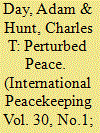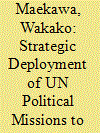|
|
|
Sort Order |
|
|
|
Items / Page
|
|
|
|
|
|
|
| Srl | Item |
| 1 |
ID:
189897


|
|
|
|
|
| Summary/Abstract |
Why is the implementation of civil war peace agreements comparatively higher in some countries than in other countries? In this study, I address this puzzle by investigating the effects of insider-outsider leader turnover on the execution of peace agreements. The idea is that leaders should be the fundamental units of analysis to explain the implementation of peace agreements due to more frequent leadership changes than state-level variables, such as the level of democracy, political system, military capability, and GDP per capita. Besides, leader turnover poses a commitment problem in peace processes if outsider leaders differ in their resolve and revise inherited agreements. I test this hypothesis quantitatively using feasible generalized least squares (FGLS) regressions to analyze the panel dataset of this research that covers 34 comprehensive peace agreements of 31 countries from 1989 to 2015. The findings of this study demonstrate the positive impacts of insider leader turnover and the adverse effects of outsider leader turnover on the execution of peace agreements. Hence, whether the implementation of peace agreements will continue depends on who comes to power.
|
|
|
|
|
|
|
|
|
|
|
|
|
|
|
|
| 2 |
ID:
189899


|
|
|
|
|
| Summary/Abstract |
Do democratic or non-democratic countries contribute more personnel to UN peacekeeping operations? While earlier studies found that democracies make larger contributions than non-democracies, recent research has challenged these findings. Scholarship in this area, however, has largely conceived of ‘non-democracy’ as a monolithic category, despite a growing body of research delineating distinct types of illiberal regimes and identifying their divergent behaviours in a range of domestic and international contexts. In this article, I argue that non-democracies’ personnel contributions to peacekeeping operations vary based on different ‘type’ of illiberal regime, and that this variation is contingent on two main factors: the influence of the military within the regime, and the extent to which a regime values the prestige associated with large-scale peacekeeping contributions. I test this proposition by statistically analyzing data from UN peacekeeping operations between 1991–2018. The findings indicate that single-party regimes are likely to make significantly smaller contributions than democracies; the contribution behaviour of other types of non-democracies is less discernible from their democratic counterparts.
|
|
|
|
|
|
|
|
|
|
|
|
|
|
|
|
| 3 |
ID:
189896


|
|
|
|
|
| Summary/Abstract |
This article explores the application of complexity theory to UN peacekeeping. To date, peacekeeping has been dominated by linear models of change, assuming that conflict settings can be addressed by elite-driven peace processes, gradual improvements to state institutional capacity, and development programming. However, this article argues that complexity theory offers a far more accurate and useful lens through which to view the work of peacekeeping: conflict settings represent complex, interdependent socio-political systems with emergent qualities giving them the capacity to self-organize via feedback loops and other adaptive activity. Self-organization means such systems are highly resistant to attempts to change behaviour via top-down or input-output approaches. In fact, peacekeeping itself is endogenous to the systems it is trying to change, often displaying the same kinds of self-organization typical of complex systems elsewhere. Drawing on experience working and conducting fieldwork in the UN peacekeping mission in Democratic Republic of the Congo, this article argues that UN peacekeeping operations should view themselves as actors within the complex conflict ecosystem, looking to enable transformational change from within, rather than impose liberal Western models from without.
|
|
|
|
|
|
|
|
|
|
|
|
|
|
|
|
| 4 |
ID:
189901


|
|
|
| 5 |
ID:
189900


|
|
|
|
|
| Summary/Abstract |
This article introduces an analytical framework for studying and interpreting the sometimes surprisingly different ‘shapes’ (key topics and approaches) of donor-funded responses to sexual violence in and after armed conflict. Our framework highlights processes of politicization, depoliticization, and technicalization and their influence on interventions. Drawing on available studies, published documents, and our own field research in the Democratic Republic of Congo (DRC) and Sierra Leone, we show that donor-funded responses to sexual violence since the early 2000s have taken remarkably different shapes – despite the emergence of influential international policy narratives and roughly similar forms of sexual violence in both contexts. A focus on context-specific processes of politicization, depoliticization, and technicalization reveals how these differences came about and persisted over time. (De-)Politicization and technicalization of sexual violence as a ‘weapon of war’ in DRC have led to medicalized and security-centred statebuilding interventions in the county's eastern conflict zones. By contrast, donor-funded responses in Sierra Leone framed and addressed sexual violence as ‘domestic violence’ even before the war had officially ended. We find that these different shapes emerged from initial differences in (de)politicization and technicalization processes driven by different ‘first responders’ in both contexts, which created enduring path dependencies.
|
|
|
|
|
|
|
|
|
|
|
|
|
|
|
|
| 6 |
ID:
189898


|
|
|
|
|
| Summary/Abstract |
Although United Nations peacekeeping operations (UN PKOs) produce positive outcomes for peace, some missions are strategically replaced by cheaper and smaller UN political missions (PMs). This article explores why certain peacekeepers are replaced by UN PMs and unpacks the exit strategy of UN PKOs. The logic of demand-side and supply-side perspectives is evaluated using data on the deployment of UN peacekeepers and UN PMs in post-civil war countries between 1993 and 2016. Signing comprehensive peace agreements (CPAs) increases the chances of UN PKOs being replaced by UN PMs because as the willingness to develop politically increases, the demand for civilian personnel after demilitarization also rises. On the supply side, as the preferences of the five permanent members of the UN Security Council concerning target states become more heterogenous, UN PKOs are more likely to be replaced by UN PMs because coordination problems encourage members to choose less burdensome missions.
|
|
|
|
|
|
|
|
|
|
|
|
|
|
|
|
|
|
|
|
|